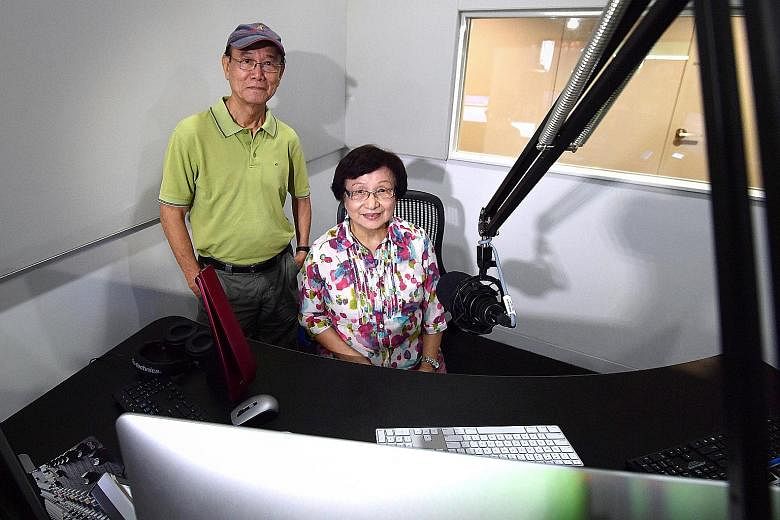Seventy-six-year-old Liang Tian has been a Capital 95.8 FM dialect newsreader for 36 years, but he has never taken a day of medical leave, even when he has a flu or a fever.
"As long as I can walk, I'll make my way to work. If I don't do it, who will?" said Mr Liang, who is also a veteran Mediacorp actor.
He reads Hakka news at the Mandarin radio station thrice a week, and is one of 25 dialect newsreaders there. They are mostly in their 60s and 70s.
Sandwiched between Mandarin radio programmes, each news segment is three to four minutes long, and available daily in Teochew, Hokkien, Cantonese, Hakka, Foochow and Hainanese.
They cater to listeners, mostly senior citizens, who are more familiar with these dialects than Mandarin.
Capital 95.8 FM is the only radio station here which offers news bulletins in Chinese dialects. Of the newsreaders, six read in Cantonese, five in Hokkien and five in Teochew, four in Hainanese, three in Hakka and two in Foochow.
It can be challenging being a dialect newsreader because one needs to be quick and accurate with translations. About 20 to 25 minutes before the readers go on air, they are given a Mandarin script which they have to translate into dialect before the live recording.
Mr Liang said: "When we read the news, it has to be smooth - even if we stumble, we need to keep reading. Some words can't be translated directly from Mandarin to dialect, so we have to make minor tweaks too."
For example, spoken Teochew here is different from that in China, as Singaporean Teochews are not regularly exposed to its linguistic developments, said Teochew newsreader Lim Ngian Tiong, 65.
He usually substitutes "fei zao" - the Chinese word for soap - with the Malay word "sabun" instead of its Teochew term as it is more understandable to local Teochews.
Another bigger challenge they face is breaking news, which is sometimes passed to them via last-minute bulletin inserts.
Cantonese newsreader Chow Pak Hong, 70, said: "We need to be very flexible and learn to read on the go. It's not a job for everyone. You must also have the right radio voice, and the correct technique to translate the script."
When Mr Chow first started out, he often stumbled as he found the translation difficult. Now, with his years of experience, he is able to translate the script adeptly during the short preparation time. When he goes on air, Cantonese rolls smoothly off his tongue.
It helps to annotate the script during the preparation process, said Hokkien newsreader Ng Lay Geok, 74. She routinely underlines phrases which she needs to emphasise, such as people's names, so that her speech flows better.
When they are not reading the news, Mr Lim and Madam Ng give dialect lessons, in Teochew and Hokkien respectively, at clan associations.
Madam Ng has also conducted classes for bankers and medical students who want to communicate better with their Hokkien-speaking clients, as well as one-to-one Hokkien tuition for working adults.
Mr Liang predicts a future shortage of radio newsreaders as there are fewer speakers with radio presence. "We are like extinct animals now," he said.
He had previously mentored eight students, but most of them could not cope with the demands of the job.
These dialect newsreaders view their job as a form of social service.
They read important announcements to their audience so that they can understand them in the language they are most familiar with.
During the 2003 Sars outbreak, for example, they helped to convey health-related updates to listeners.
Mr Liang added: "Many people understand Mandarin now, but hearing their dialects on radio gives seniors and listeners a sense of intimacy with their heritage."


